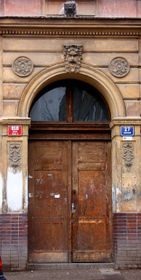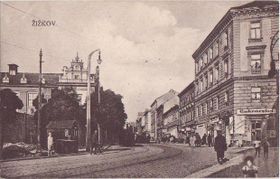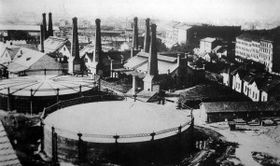Bořivojova 27 Street, Žižkov
 Behind this door was the yard where stood the factory
Kafka’s brother-in-law, Karl Hermann, married to Elli Kafka, founded a small industrial factory “Prague Asbestos Works” in 1910 in the workers' quarter of Žižkov. The production of asbestos and asbestos products was a promising manufacturing branch at the beginning of the 20th century. The sales of asbestos goods climbed steadily; no one spoke of the health risks. Asbestosis, a lung disease was first described in 1900 but couldn't halt this promising branch of industry. Kafka’s father decided that also Franz could prove himself as a factory owner, at least part-time. Thus, with the financial investment of his father, Franz became a partner in the Prague Asbestos Works. Soon Kafka realized that he had made a big mistake. He hated the factory and took part in its management only with great reluctance.
Behind this door was the yard where stood the factory
Kafka’s brother-in-law, Karl Hermann, married to Elli Kafka, founded a small industrial factory “Prague Asbestos Works” in 1910 in the workers' quarter of Žižkov. The production of asbestos and asbestos products was a promising manufacturing branch at the beginning of the 20th century. The sales of asbestos goods climbed steadily; no one spoke of the health risks. Asbestosis, a lung disease was first described in 1900 but couldn't halt this promising branch of industry. Kafka’s father decided that also Franz could prove himself as a factory owner, at least part-time. Thus, with the financial investment of his father, Franz became a partner in the Prague Asbestos Works. Soon Kafka realized that he had made a big mistake. He hated the factory and took part in its management only with great reluctance.
Kafka wrote these words about the female workers in the factory: “Yesterday in the factory. The young women there dressed in their in-and-of-themselves unbearable, dirty, and disheveled clothes, with their unkempt hair as if they had just got up out of bed, along with the incessant nose of the power transmissions and their facial expressions held fast in place by individual machines, that, although automatic, randomly stall; these women are not human beings, you do not greet them, you do not excuse yourself if you bump into them;, if they are called to perform another small task, they carry it out, but immediately return to the machine, with a movement of the head you show them where they should help out, they stand there in their slips, they are delivered up to the smallest power and don’t even have enough calm comprehension to ingratiate themselves to this power with looks and signs of subservience. As soon as it six o’clock, however, and they call out the time to each other, they untie the bandanas around their necks and from their hair, dust themselves off with a brush, that travels through the work area and is impatiently called for, they pull their skirts on over their heads and if they get their hands clean as good as they can, they are in the end women after all, they can smile despite their pallor and bad teeth, shake their stiffened bodies, you can’t bump into them, look at them, or overlook them; you back into the greasy wooden crates in order to make way for them, keep your hat in hand, when they say good evening and you don’t know how to accept it when one of them holds your winter coat for you to slip into.”
 Photo: kauza3.cz
Kafka’s ride to the factory took him out of the Old Town into the sprawling suburbs, to the workers' quarter of Žižkov. He wrote: “Yesterday in the factory. Drove back with the electric tram, sat in a corner with outstretched legs, saw people outside, the lit lamps in stores, walls of the viaducts we passed under, again and again backs and faces of people, an overland road leading out of the commercial street in the suburb with nothing human but people returning home, the penetrating electric lights of the railroad station area burned into the darkness, low strongly tapered smokestacks of the gas works, a placard announcing the guest appearance of a woman singer de Treville, that gropes its way along the walls until reaching a street in the vicinity of the cemetery, from where it returned with me from the coldness of the fields in the habitable warmth of the city.… That’s why I always set foot in the city outskirts with mixed feelings of fear, forlornness, pity, curiosity, arrogance, joy of traveling, manliness and come back with a feeling of comfort, earnestness, and quiet; especially from Žižkov.“
Photo: kauza3.cz
Kafka’s ride to the factory took him out of the Old Town into the sprawling suburbs, to the workers' quarter of Žižkov. He wrote: “Yesterday in the factory. Drove back with the electric tram, sat in a corner with outstretched legs, saw people outside, the lit lamps in stores, walls of the viaducts we passed under, again and again backs and faces of people, an overland road leading out of the commercial street in the suburb with nothing human but people returning home, the penetrating electric lights of the railroad station area burned into the darkness, low strongly tapered smokestacks of the gas works, a placard announcing the guest appearance of a woman singer de Treville, that gropes its way along the walls until reaching a street in the vicinity of the cemetery, from where it returned with me from the coldness of the fields in the habitable warmth of the city.… That’s why I always set foot in the city outskirts with mixed feelings of fear, forlornness, pity, curiosity, arrogance, joy of traveling, manliness and come back with a feeling of comfort, earnestness, and quiet; especially from Žižkov.“
 The Žižkov gas works
Kafka hated the factory and after he toyed with the idea of suicide, even Max Brod intervened in order to convince Kafka’s mother of the seriousness of the situation. Paul Hermann, the brother of Karl, replaced Franz in the seat. Than the First World War broke out, Karl Hermann was drafted into the army and Kafka had to again devote more time to the factory. The dearth of raw materials and other essentials, a consequence of the war, did not allow the undisturbed continuance of production. In 1917 application was made to liquidate and even before the end of the war in 1918 the Prague Asbestos Works Hermann & Co. Was struck from the commercial register.
The Žižkov gas works
Kafka hated the factory and after he toyed with the idea of suicide, even Max Brod intervened in order to convince Kafka’s mother of the seriousness of the situation. Paul Hermann, the brother of Karl, replaced Franz in the seat. Than the First World War broke out, Karl Hermann was drafted into the army and Kafka had to again devote more time to the factory. The dearth of raw materials and other essentials, a consequence of the war, did not allow the undisturbed continuance of production. In 1917 application was made to liquidate and even before the end of the war in 1918 the Prague Asbestos Works Hermann & Co. Was struck from the commercial register.
